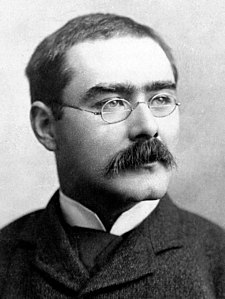“Words are, of course, the most powerful drug used by mankind.” – Rudyard Kipling

Rudyard Kipling (image courtesy Wikimedia)
Another in the series I began last week about writers who have become neglected. This week’s choice is one whose literary reputation has been as high, as low, and as controversial as any writer in the history of literature. Rudyard Kipling has been revered – and reviled – by authors as diverse as Jorge Luis Borges, R.K. Narayan, and George Orwell – who noted that Kipling:
…sold out to the British governing class, not financially but emotionally. This warped his political judgement, for the British ruling class were not what he imagined, and it led him into abysses of folly and snobbery, but he gained a corresponding advantage from having at least tried to imagine what action and responsibility are like.
For those who know Kipling – and that’s almost everyone – only for “Rikki-Tikki-Tavi” or The Jungle Book or Kim – Kipling is a dimly remembered writer of exciting stories for young readers. But he was a complicated figure who produced a wide range of work with interesting themes.
My own interest in Kipling has a personal context. Like others of my generation, I met Kipling through the works mentioned above. But in undergraduate school I came across a couple of Kipling’s “adult” works, The Light that Failed and “Without Benefit of Clergy.” The former work is the story of a painter who slowly goes blind and who struggles with unrequited love. While critics have not been kind to the work, it has a certain power and an important place in Kipling’s canon as his first novel. “Without Benefit of Clergy” is the story of an Englishman who falls in love with a Muslim woman and who lives in secret with her to protect both his reputation and hers. Critics have been kinder to this work, and its theme of love across ethnic and religious barriers will resonate with modern readers.
Fascinated by these and a couple of other works (I also read Kipling’s coming of age tale Captains Courageous), I became convinced that Kipling was ripe for rediscovery. In fact, my first proposal for my master’s thesis was to write about Kipling. My adviser remonstrated with me about the unpopularity of such a choice mentioning Kipling’s jingoism and support of Imperialism and further admonishing me that writing about a figure whose reputation was so in eclipse (this despite Kipling’s being a Nobel laureate) would likely harm my career. Reluctantly, I gave up my idea of reviving interest in him.
Those two knocks on Kipling – his support of Imperialism and his jingoism – have some clear justification, certainly. After all, his poem “The White Man’s Burden” gave us one of the more odious terms associated with racist Imperial policy. (Irony #1: Kipling wrote the poem as a paean to Progressive icon Teddy Roosevelt and U.S. policy in the Philippines.) And certainly his jingoistic poems such as “Tommy” and “My Boy Jack” sentimentalize the sacrifices of British military members in ways that served government policy. (Irony #2: Kipling learned the bitterest of lessons about real British military sacrifice when he used his political/military connections to gain a commission for his son John in the Irish Guards during WWI; John, who suffered from poor eyesight, died needlessly at the Battle of Loos in France.)
But what is less well known is that Kipling learned from his loss and became a deeper, more poignant writer, as his story “The Gardener” illustrates. And perhaps no writer spoke more honest and bitter words of himself than Kipling did in his poem “Common Form” from his first post WWI book, Epitaphs of War:
If any question why we died,
Tell them, because our fathers lied.
So I guess what I’m trying to tell you is that Kipling is more than a daring mongoose named Rikki-Tikki-Tavi and a jolly bear named Baloo. He was also more than a cheerleader for Imperialism. He’s a writer worth exploring.
You can read some interesting Kipling here, here, and here.
(Irony #3: I wrote my master’s thesis on Jane Austen. Kipling, in working his way through mourning for his son John, read Jane Austen’s works aloud with his family every evening for months. Coincidence? Perhaps. Perhaps not.)

Pingback: Writers of Slender Acquaintance: Rhian Who…? | The New Southern Gentleman
Pingback: Writers of Slender Acquaintance: Rhian Who…? | Progressive Culture | Scholars & Rogues
Pingback: Writers of Slender Acquaintance: Karel Capek | The New Southern Gentleman
Pingback: Writers of Slender Acquaintance: Karel Capek | Progressive Culture | Scholars & Rogues
Pingback: Writers of Slender Acquaintance: Jorge Ferretis | The New Southern Gentleman
Pingback: Writers of Slender Acquaintance: Jorge Ferretis | Progressive Culture | Scholars & Rogues